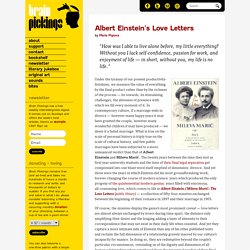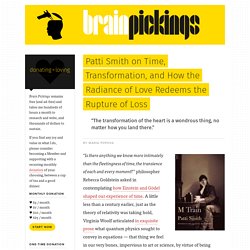

How to Be Alone: An Antidote to One of the Central Anxieties and Greatest Paradoxes of Our Time. By Maria Popova “We live in a society which sees high self-esteem as a proof of well-being, but we do not want to be intimate with this admirable and desirable person.” If the odds of finding one’s soul mate are so dreadfully dismal and the secret of lasting love is largely a matter of concession, is it any wonder that a growing number of people choose to go solo?
The choice of solitude, of active aloneness, has relevance not only to romance but to all human bonds — even Emerson, perhaps the most eloquent champion of friendship in the English language, lived a significant portion of his life in active solitude, the very state that enabled him to produce his enduring essays and journals. And yet that choice is one our culture treats with equal parts apprehension and contempt, particularly in our age of fetishistic connectivity. Solitude, the kind we elect ourselves, is met with judgement and enslaved by stigma. Illustration by Alessandro Sanna from 'The River.' Donating = Loving. Iconic Psychiatrist Carl Jung on Human Personality in Rare BBC Interview. Albert Einstein’s Love Letters. By Maria Popova “How was I able to live alone before, my little everything?

Without you I lack self-confidence, passion for work, and enjoyment of life — in short, without you, my life is no life.” Under the tyranny of our present productivity-fetishism, we measure the value of everything by the final product rather than by the richness of the process — its rewards, its stimulating challenges, the aliveness of presence with which we fill every moment of it. In contemporary culture, if a marriage ends in divorce — however many happy years it may have granted the couple, however many wonderful children it may have produced — we deem it a failed marriage.
What is true on the scale of personal history is triply true on the scale of cultural history, and few public marriages have been subjected to a more unnuanced verdict than that of Albert Einstein and Mileva Marić. Young Albert Einstein as a Zurich Polytechnic student (Photograph: Lotte Jacobi) Here is Paradise. Two days later, he writes: Patti Smith on Time, Transformation, and How the Radiance of Love Redeems the Rupture of Loss. “Is there anything we know more intimately than the fleetingness of time, the transience of each and every moment?”

Philosopher Rebecca Goldstein asked in contemplating how Einstein and Gödel shaped our experience of time. A little less than a century earlier, just as the theory of relativity was taking hold, Virginia Woolf articulated in exquisite prose what quantum physics sought to convey in equations — that thing we feel in our very bones, impervious to art or science, by virtue of being ephemeral creatures in a transient world. That transcendent transience is what beloved musician, artist, and poet Patti Smith explores in M Train (public library) — a most unusual and breathtaking book: part memoir, part dreamscape, part elegy for the departed and for time itself. A person possessing the rare gift of remaining radiant even in her melancholy, Smith grieves for her husband and her brother; she commemorates her great heroes, from friends like William S.
Smith writes: I had a black coat.